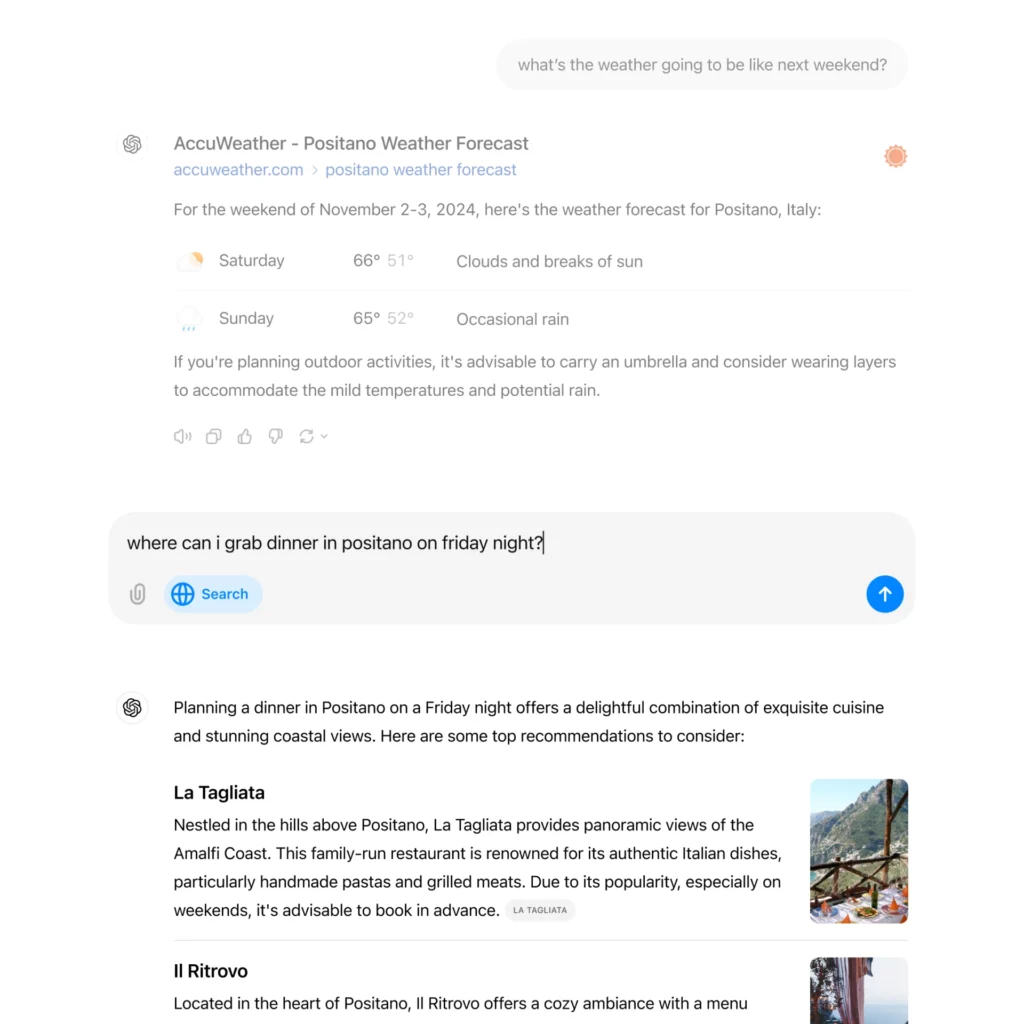OpenAI’s latest update to ChatGPT introduces integrated web search, marking a significant shift in AI-powered search. Initially available to ChatGPT Plus and Team subscribers, this feature offers real-time answers with clickable sources across categories like news, sports scores, stocks, weather, and maps. Users can access updated information within the ChatGPT interface, making it a streamlined alternative to traditional search engines.
By avoiding cluttered results and ads, ChatGPT sets itself apart from platforms like Google and Microsoft’s Bing, providing a conversational, ad-free experience. Beyond its user-focused benefits, ChatGPT’s web search has broad implications for SEO and search advertising, potentially shaping how businesses and content creators approach digital visibility.
How ChatGPT’s Search Works
ChatGPT’s web search is designed to offer a seamless experience where users can click an icon to activate a real-time search or allow the chatbot to decide when to pull in current data. The results are displayed conversationally, allowing users to interact with the latest information with clickable citations that provide transparency and foster trust.
This integration of real-time search and citations offers a different take on user experience compared to traditional engines like Google. ChatGPT’s approach emphasises quality content and minimal distraction, especially as it remains ad-free for now.
SEO in the Age of ChatGPT Search
ChatGPT’s new search feature introduces both opportunities and challenges for SEO professionals. Its focus on authoritative, trustworthy sources places a premium on credible content, nudging SEO strategies toward building strong reputations through high-quality information.
- Authority and Credibility as Key Ranking Factors: ChatGPT relies on reputable sources, often pulling information from media partners like Reuters and the Associated Press. For SEO experts, this means that establishing authority—through quality backlinks, expertise, and transparent content—becomes crucial in optimising for AI-driven search systems.
- Tracking Traffic from ChatGPT: ChatGPT’s citations include tracking tags that allow publishers to measure referral traffic. Monitoring ChatGPT-driven traffic could reveal insights into how the platform’s referrals impact audience engagement, providing analytics for SEO professionals to refine content strategies and maximise visibility.
- Conversational SEO and Query Context: ChatGPT’s conversational format demands SEO strategies that align with natural language. Queries on ChatGPT mimic casual conversation, so content should be structured to answer complex or follow-up questions. As ChatGPT considers context, tailoring content to these conversational cues becomes essential.
- Focus on Non-Transactional, Value-Driven Content: ChatGPT’s search favours content that informs and guides rather than pushing immediate conversions. This shift allows brands to position themselves as trusted resources by prioritising educational content, detailed guides, and reliable information—making non-transactional content an area of SEO focus.
Implications for Search Advertising
ChatGPT’s ad-free environment challenges the advertising-heavy approach of Google’s search model, potentially shifting the search advertising landscape in the following ways:
- Rising Importance of Organic Content Visibility: With no sponsored results, ChatGPT’s search platform drives visibility solely through quality content. Brands looking for exposure on ChatGPT will need to focus on organic reach and content marketing, putting less emphasis on traditional PPC ads.
- Exploring Alternative Revenue Models: ChatGPT’s ad-free model is currently sustainable through subscriptions, but as access expands to free users, OpenAI may consider alternative monetisation strategies. This could include optional premium placements for content providers or strategic partnerships to cover operational costs while maintaining a user-centred experience.
- Emphasis on Voice Search and Multimodal Experiences: OpenAI plans to extend ChatGPT’s search capabilities to its Advanced Voice and Canvas products. As these features expand, advertisers may need to optimise for voice-based queries and multimodal content, creating a diversified approach that appeals to both text and voice interfaces.
Competitive Dynamics in AI-Powered Search
ChatGPT’s integration of search marks its entry into an AI search landscape dominated by Google and Microsoft. Google’s Gemini AI and Microsoft’s Copilot offer real-time search capabilities, but both are ad-supported and designed to cater to high-transaction user needs. ChatGPT, by contrast, emphasises quality content and an ad-free experience, catering to users who seek reliable information without distractions.
As ChatGPT’s reach grows, it could divert users from ad-heavy search engines, making it an attractive choice for those seeking more straightforward, accurate answers. The absence of ads may appeal to users interested in uninterrupted information access, and the reliance on trusted sources could further establish ChatGPT as a reliable AI-powered alternative in the search space.
Addressing Challenges: Accuracy and Content Integrity
While ChatGPT’s real-time access to web information improves accuracy, challenges remain. AI chatbots, including ChatGPT, sometimes experience “hallucinations”—cases where they confidently present incorrect information. OpenAI addresses this by prioritising reputable sources and implementing measures to verify facts. The built-in citations also help users fact-check responses, enhancing trust and transparency.
For sensitive areas, such as political content, ChatGPT pays extra attention to accuracy, working with reliable sources to prevent misinformation. As the U.S. presidential election approaches, OpenAI is particularly cautious about election-related queries, aiming to elevate trustworthy information over unverified sources.
Future Prospects for ChatGPT Search
OpenAI has ambitious plans for ChatGPT’s search feature, including expanding it to include shopping and travel-related queries. In addition to providing real-time answers, OpenAI’s future updates could incorporate purchasing and booking options, transforming ChatGPT into a multifaceted tool that caters to diverse user needs.
This evolution represents a paradigm shift in how users interact with information, positioning ChatGPT as a potential frontrunner in AI search. For SEO professionals, the platform demands a focus on quality and credibility; for advertisers, it represents a compelling, ad-free space to gain organic visibility.




RECOMMENDED FOR YOU
OpenAI Begins Testing Ads Inside ChatGPT
For the past two years, marketers have treated ChatGPT…
For the past two years, marketers have treated ChatGPT…
Google Rebuilds Checkout For AI Shopping
Agentic shopping has moved from theory to reality, and…
Agentic shopping has moved from theory to reality, and…
LinkedIn Reveals Jobs On The Rise 2026
LinkedIn has released its latest Jobs on the Rise…
LinkedIn has released its latest Jobs on the Rise…